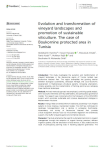Hamrita A., Haouala F., Annabi K., Kouki R., Rejili M., Dridi B.A. (2025). Evolution and transformation of vineyard landscapes and promotion of sustainable viticulture. The case of Boukornine protected area in Tunisia. Frontiers in environmental science, 01/01/2025, vol. 13, p. 1614675.
https://doi.org/10.3389/fenvs.2025.1614675
https://doi.org/10.3389/fenvs.2025.1614675
| Titre : | Evolution and transformation of vineyard landscapes and promotion of sustainable viticulture. The case of Boukornine protected area in Tunisia (2025) |
| Auteurs : | A. Hamrita ; F. Haouala ; K. Annabi ; R. Kouki ; M. Rejili ; B.A. Dridi |
| Type de document : | Article |
| Dans : | Frontiers in environmental science (vol. 13, 2025) |
| Article en page(s) : | p. 1614675 |
| Langues : | Anglais |
| Langues du résumé : | Anglais |
| Catégories : |
Catégories principales 06 - AGRICULTURE. FORÊTS. PÊCHES ; 6.4 - Production Agricole. Système de ProductionThésaurus IAMM VITICULTURE ; DURABILITE ; PAYSAGE ; TUNISIE |
| Résumé : | Introduction This study investigates the evolution and transformation of vineyard landscapes in the Boukornine region of Tunisia, located near Boukornine National Park. The region exemplifies the growing tension between ecological sustainability, landscape heritage, and socio-economic development in Mediterranean viticultural systems. Increasing urbanization, climate variability, and the modernization of farming practices are reshaping these traditional landscapes.Methods A mixed-methods approach was employed, combining spatial analysis, semi-structured interviews with key stakeholders, and participatory governance models. The research was conducted within the framework of the OENOMED project, which promotes sustainable and inclusive development strategies in Mediterranean viticulture.Results Findings reveal a marked shift from traditional, biodiversity-rich vineyard systems to more intensive, mechanized models. This shift has contributed to landscape homogenization and a decline in ecological functionality. Nonetheless, the vicinity of Boukornine National Park provides critical ecosystem services-such as microclimate regulation and biodiversity support-that buffer vineyards against environmental stressors.Discussion The study emphasizes the need for sustainable transitions in vineyard management through the adoption of organic farming practices, efficient irrigation systems, and the valorization of local terroirs. It also underscores the value of participatory planning tools in fostering adaptive governance. The integration of ecological, cultural, and territorial dimensions is essential for building resilient vineyard landscapes in Mediterranean regions undergoing rapid environmental and urban transformation. |
| Cote : | En ligne |
| URL / DOI : | https://doi.org/10.3389/fenvs.2025.1614675 |







